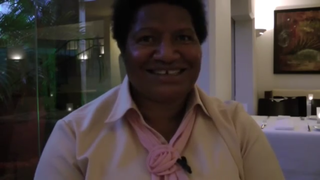Related Research Articles

For administrative purposes, Papua New Guinea is divided into administrative divisions called provinces. There are 22 province-level divisions, which include 20 provinces, the autonomous region of Bougainville and the National Capital District of Port Moresby.
The United Party is a political party in Papua New Guinea. As of May 2019, it has one seat in the National Parliament and is led by Minister for Foreign Affairs, Rimbink Pato.
The Christian Democratic Party is a political party in Papua New Guinea.
The People's First Party is a political party in Papua New Guinea.

Morobe Province is a province on the northern coast of Papua New Guinea. The provincial capital and largest city is Lae. The province covers 33,705 km², with a population of 674,810, and since the division of Southern Highlands Province in May 2012 it is the most populous province. It includes the Huon Peninsula, the Markham River, and delta, and coastal territories along the Huon Gulf. The province has nine administrative districts. At least 101 languages are spoken, including Kâte and Yabem language. English and Tok Pisin are common languages in the urban areas, and in some areas pidgin forms of German are mixed with the native language.
Dame Josephine Abaijah, is a Papua New Guinean former politician. She was the first woman to be elected to the House of Assembly in 1972.
The United Resources Party is a political party in Papua New Guinea.

Nahau Rooney was a Papua New Guinean politician. From 1977 to 1987 she was a member of the newly founded post-independence National Parliament of Papua New Guinea.

John Momis is a Bougainvillean politician who served as the President of the Autonomous Region of Bougainville in Papua New Guinea between 2010 and 2020.

Luther Akisawa Wenge is a Papua New Guinean politician. He was Governor of Morobe Province and a member of the National Parliament of Papua New Guinea as a member of the Pipol First Party from 1997 to 2012.
Theodore Zibang Zurenuoc, CMG is a Papua New Guinean politician.

Bumayong is an outer suburb of Lae in the Morobe Province, Papua New Guinea.
Bartholomew "Bart" Philemon is a Papua New Guinean politician.
The People's United Assembly is a political party in Papua New Guinea.

General elections were held in Papua New Guinea between 24 June and 8 July 2017. The writs for the election were issued on 20 April, and candidate nominations closed on 27 April.
Robert Atiyafa is a Papua New Guinean politician. A former Premier of Eastern Highlands Province under the former provincial government system, he has been a member of the National Parliament of Papua New Guinea since 2012, representing Henganofi Open, first as an independent and then later for the People's National Congress. He has been Minister for Police in the government of Peter O'Neill since February 2014.
Francis Awesa is a Papua New Guinean politician. A former Premier of the Southern Highlands under the old provincial government system, he was a member of the National Parliament of Papua New Guinea from 2007 to 2017, representing the electorate of Imbonggu Open. A Papua New Guinea Party member in his first term, he subsequently switched to the People's National Congress after PNC leader Peter O'Neill became Prime Minister in 2011. He was Minister for Transport, Works and Civil Aviation (2011), Minister for Transport and Works (2011-2012) and Minister for Works and Implementation (2012-2017) in the government of Peter O'Neill.

Sam Basil is a Papua New Guinean politician. He has been a member of the National Parliament of Papua New Guinea since 2007, representing the electorate of Bulolo Open. From 8 June 2019, to August 2019 Basil served as the Treasurer of Papua New Guinea.

Julie Soso Akeke is a Papua New Guinean politician. She was the Governor of Eastern Highlands Province from 2012 to 2017.
Sir Sinake Giregire was a Papua New Guinean businessman and politician.
References
- 1 2 3 Women in Politics: Voices from the Commonwealth. Commonwealth Secretariat. 1999. pp. 104–107. ISBN 9780850925692.
- 1 2 Saffu, Yaw (1996). 1992 PNG Election. Department of Political and Social Change, Research School of Pacific and Asian Studies, Australian National University. p. 111.
- ↑ "Volunteerism a special joy". PNG Post-Courier. 7 December 2001.
- ↑ Ley, Allison (1997). Political decentralisation in a new state: the experience of provincial government in Papua New Guinea. Crawford House Publishing. p. 210.
- ↑ Brouwer, Elizabeth C., Harris, Bruce M. & Tanaka, Sonomi (1998). Gender Analysis in Papua New Guinea. World Bank Publications. p. 82.CS1 maint: multiple names: authors list (link)
- ↑ "Women want space". PNG Post-Courier. 24 January 2011.
- ↑ "By NELLIE SETEPANO". PNG Post-Courier. 14 January 2011.